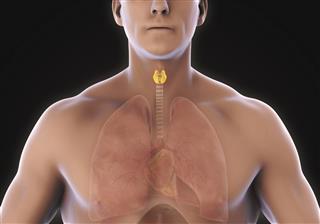
Hypothyroidism is a health condition that is associated with symptoms like weight gain, puffy face, fatigue, etc., and needs to be controlled as soon as possible. Blood tests will determine low thyroid levels…
Hypothyroidism
Hypothyroidism is a disorder caused due to formation of less thyroid hormone, in comparison to the normal body requirements. In such cases, the thyroid gland is called to be ‘sluggish or underactive’. Inadequate thyroid hormones result in slowing down of the overall body metabolism.
Who does it affect?
Hypothyroidism affects both men and women, however, women are eight times more susceptible. People of all ages can be affected and over 5 million Americans have this disorder. Severe hypothyroidism in adults is called ‘Myxedema’ and in children it is called ‘Cretinism’.
Hashimoto’s disease (inflammation of the thyroid gland) is one of the major reasons for low thyroid levels. This is an autoimmune disease, wherein the body fails to recognize the thyroid gland as its own member and begins to attack it with antibodies, as if it were a foreign body. This not only damages the gland’s ‘hormone releasing capacity’ but also destroys the gland. Iodine-deficient diets, malfunctioning of the pituitary gland or hypothalamus, infection of the thyroid gland, radiation treatments to treat hyperthyroidism and congenital defects are some other reasons responsible for low thyroid levels. Birth control pills are also harmful for the thyroid gland, as estrogen inhibits the gland’s activity.
Symptoms of Low Thyroid Levels
‘Silent disease’ is another name given to hypothyroidism, because it reveals itself in a very gradual manner. Maximum number of people fail to recognize this disorder. They cannot be blamed for this, because symptoms of hypothyroidism are very subtle and to make matters worse, are often similar to the ones of aging. The severity of the hormone deficiency determines the severity of the symptoms. Low thyroid levels affect different parts of the body in different ways. Since thyroid hormone is responsible for regulation of body metabolism, its deficiency results in slowing down of body’s metabolic processes. Let’s have a look at the symptoms.
Integumentary System
Symptoms of Low Thyroid Levels:
- Thinning eyebrows
- Brittle nails
- Yellowish-tinge to the skin
Pimples and blackheads - Pale and malnourished skin
- Dry, coarse skin
- Cracked heels
- Dull hair
Hair loss - Sensitivity to cold
Gastrointestinal System
Symptoms of Low Thyroid Levels:
- Constipation
- Bloating
- Excessive weight gain
Cardiovascular System
Symptoms of Low Thyroid Levels:
- High cholesterol levels
- Breathlessness
- Getting tired easily
- Increased heart rate and palpitations
- Anemia
Muscular System
Symptoms of Low Thyroid Levels:
- Feel like taking frequent naps
- An overall sense of weakness
- Muscle stiffness
- Extreme fatigue
- Muscle aches and muscle cramps
- Inability to carry out the day’s tasks energetically
- Feel exhausted very soon
- Feel exhausted even after sleeping for long hours.
Reproductive System
Symptoms of Low Thyroid Levels:
- Lack of sex drive
- Problems in conceiving
- Irregularities in the menstrual cycle (no periods to heavy, frequent periods)
- Increased risk of miscarriage
- Onset of early menopause (older women)
Respiratory System
Symptoms of Low Thyroid Levels:
- Insomnia
- Breathlessness and fatigue
- Hoarse voice
Nervous System
Symptoms of Low Thyroid Levels:
- Memory loss/foggy memory
- Irritability
- Concentration problems
- Mood swings
- Easily depressed
- Anxiety
Excretory System
Symptoms of Low Thyroid Levels:
- Puffiness of the face
- Fluid retention in extremities
- Swollen eyelids
Low Thyroid levels
When the levels of T4 and T3 in the blood fall, the hypothalamus releases ‘thyroid releasing hormone’ (TRH) into the bloodstream. As the level of TRH in the blood increases, the pituitary gland gets the signal from the hypothalamus, and as a result releases ‘thyroid stimulating hormone’ (TSH). TSH stimulates the thyroid gland to produce and release more hormone into the blood. However, if the thyroid hormone levels in the blood are high, the hypothalamus stops releasing TRH. The pituitary gland picks up the low TRH signal and stops releasing TSH, thereby regulating the level of thyroid hormone in the bloodstream. Thus, it’s a link between the hypothalamus, pituitary gland and the thyroid gland; all working in coordination with one another.
According to most laboratories in the US, the normal level of TSH that should be present in the bloodstream ranges from 0.4-4.0 mIU/L. The thyroid levels can be determined by performing the ‘T7’ or ‘FTI’ blood test. For any reason, if the thyroid levels deviate from this range, then there is cause for concern. High thyroid levels in the bloodstream is a disorder termed as hyperthyroidism, whereas, low thyroid level is termed as hypothyroidism. Hypothyroidism is more common as compared to hyperthyroidism.
The Thyroid Gland
Thyroid gland is a small butterfly-shaped gland, situated just below the larynx (voice box) or ‘Adam’s apple’ and forms a significant part of the endocrine system. It consists of two lobes lying on either side of the trachea, joined together by thyroid tissue called ‘isthmus’. The function of the thyroid gland is to convert the iodine from the food, into two main thyroid hormones: thyroxine (T4) and triiodothyronine (T3). T4 is the main hormone produced by the thyroid gland, however, it is inactive and has to be converted to T3. These thyroid hormones are essential for regulation of body metabolism, temperature regulation, maintaining calcium balance and overall growth and development of the body. Thyroid gland is controlled by a pea-sized endocrine organ in the brain called the pituitary gland (master gland), which is itself regulated by the hypothalamus (part of the brain).
A person with low thyroid levels may not experience all the above-mentioned symptoms. Since the symptoms of low thyroid hormone levels are common to various other ailments as well, the only way to know for sure, is by taking a blood test. Do not jump to conclusions by connecting two and two together. Self diagnosis is never a good idea, instead always consult your medical practitioner. Simple and effective medical treatment is available for treating low thyroid levels.
Disclaimer: This HealthHearty article is for informative purposes only, and should not be used as a replacement for expert medical advice.




